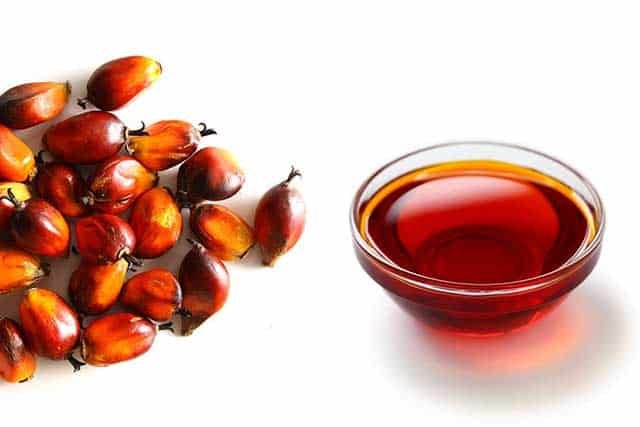Palm oil for dogs: The use of palm oil in pet foods and treats has been debated for some time now. Recently, it was discovered that the oil is not only bad for humans, but for our canine companions as well.
Table of Contents
Makes sense, since we humans and our dogs share similar physiology and we might as well be eating the same things.
Some breeds such as pugs or bulldogs can’t eat food that contains high levels of fat because they have a predisposition to heart disease.
What is Palm Oil?

Palm oil, or Elaeis guineensis, is a vegetable oil that originates from the fruit of the oil palm tree. It can be consumed as a solid or liquid.
Also Read: How to feed royal canin maxi starter to a puppy? Feeding Guide.
Palm oil is one of the world’s most versatile cooking oils and its characteristics include being odorless and colorless. The fruit it comes from is greenish-yellow when ripe and oval-shaped.
Oil palm trees are grown in many tropical countries, primarily in Malaysia and Indonesia.
The oil is extracted from the fruit of the tree by cutting it open, drying it in the sun, and pressing out the oil. Palm oil has become widely popular because it is inexpensive to produce and is versatile when cooking.
Palm oil can be used as a direct replacement for many other oils when cooking by using them in a 1:1 ratio.
Can Palm Oil Make My Dog Sick?
Palm oil naturally contains many fatty acids, including linoleic acid, which may be harmful to dogs because it can cause vomiting and diarrhea.
The glycerides in palm oil are also difficult for dogs to digest. These two features of palm oils can lead to digestive problems in dogs that less-processed oils do not have the same effect on.
Palm oil is a common ingredient in pet food and treats due to its low cost, but it can be harmful to your dog if they consume too much of it.
It’s important to know what type of palm oil you’re feeding your dog because different types can have different effects.
One product that commonly contains palm oil is peanut butter. While this may not seem like a big deal, it is actually quite dangerous for our furry friends.
Dogs who consume large quantities of palm oil can get horribly sick and even die.
Just to be on the safe side, it might be best to avoid feeding your pet any peanut butter products or other foods containing oils derived from palm trees.
Can palm oil kill dogs?
The highly popular palm oil is a common cooking ingredient in many foods. The oil has been linked to numerous health scares and many people are now aware of the dangerous consequences of consuming too much.
While it may be amusing to think that such an innocuous ingredient can kill, studies have shown that it does indeed pose a risk to animals such as dogs.
Animal lovers should be wary of this information and remember to give their pets a wide berth from any foods containing the oil.
FAQs
Are There Any Side Effects of Palm Oil for Dogs?
When consumed in large quantities, palm oil can cause toxicity and gastrointestinal problems. It is best to consult with your veterinarian to determine the best palm oil for your pet.
Where Can I Find Palm Oil for Dogs?
Palm oil can be found in various pet food products. You can also buy it in supplement form from pet stores and online retailers like amazon
Are there any alternatives to giving my dog palm oil?
Yes, there are several other healthy fats you can give your dogs, such as coconut oil, olive oil, and flaxseed oil.
Conclusion
In conclusion, palm oil is safe for dogs to eat in moderation if they have a healthy diet and do not have underlying health problems.
In conclusion, palm oil is safe for dogs to eat in moderation if they have a healthy diet and do not have underlying health problems.
Symptoms of palm oil toxicity include diarrhea, vomiting, excessive thirst, lethargy, and liver failure. However, it is important to monitor the dog’s weight while feeding them foods containing high amounts of palm oil.

